Jackie Robinson
"He Beat Discrimination with Determination"
World Movers
Jackie Robinson
Joe Louis
Oscar Robertson
Jesse Owens
Other Jackie Sites
Official Site of Jackie Robinson
TIME Magazine-Jackie Robinson
NY TIMES Sound Bits
AFRO-Americ@: Jackie Robinson
Baseball Hall of Fame
Other Joe Sites
Official Site of Joe Louis
ESPN Sports Century Profile
Boxing Hall of Fame
Detroit RearView Mirror
BoxRec-Fight Record
Other Oscar Sites
Official Site of Oscar Robertson
NBA Profile
Basketball Hall of Fame Profile
Espn Sports Century Profile
Other Jesse Sites
Official Site of Jesse Owens
Espn Sports Century Profile
The Jesse Owens Foundation
Additional Sites
Espn Classic
Jim Crow and Sports
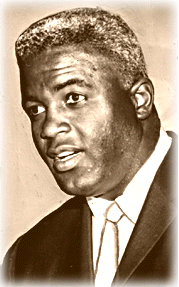
| Biography | Athletic Profile | Achievements | Event That Changed the World |
"I won't have it made until the most underprivileged Negro in Mississippi can live in equal dignity with anyone else in America."-Jackie Robinson
Biography
Jackie Robinson's storied life began on January 31, 1919 when he became the son of Mallie and Jerry Robinson. His parents like the majority of Southern blacks were sharecroppers and had trouble gaining enough profit to pay off their endless cycle of debts to their landowner. Jerry cracked under the pressure of paying debts while providing for the family and left his wife and kids. Mallie decided to leave Cairo, George and to live with family in California. Life in California was an improvement over the Deep South but it also presented some new problems. The lack of racial diversity made racism an issue and for the first time Jackie could tell his family was different from everyone else around. His mother showed him how to deal with this form of racism by standing her ground when her neighbors tried to get her out of their tiny apartment. Jackie also fell into trouble by hanging out with the wrong crowd as a teen, but family friends helped direct Jackie towards athletics.
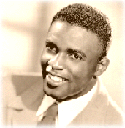 Jackie enrolled at UCLA where he excelled at basketball, track, football, and baseball. He was the first student at UCLA to be on all four-varsity teams. Although he considered his education important he realized that the opportunities for black athletes where superior to those of the educated. While attending UCLA he met his future wife, Rachel, who was a consistently there for Jackie when he needed her the most. He left UCLA before his senior year and played semi-professional football for the Honolulu Bears. He also volunteered his baseball talents to entertain underprivileged kids.
Jackie enrolled at UCLA where he excelled at basketball, track, football, and baseball. He was the first student at UCLA to be on all four-varsity teams. Although he considered his education important he realized that the opportunities for black athletes where superior to those of the educated. While attending UCLA he met his future wife, Rachel, who was a consistently there for Jackie when he needed her the most. He left UCLA before his senior year and played semi-professional football for the Honolulu Bears. He also volunteered his baseball talents to entertain underprivileged kids.
After the bombing of Pearl Harbor Jackie returned to the mainland where he signed on with the Los Angles Red Devils, a semi-professional basketball franchise. Soon though Jackie found him self being sent to Kansas to begin basic training for the war. It was through his military journey that he crossed the paths with the already proven black boxer Joe Louis. Joe used his popularity to help young black men become officers in the United States military. In 1943, at the age of 24, Jackie graduated from officer training. He faced discrimination every step of the way in the military. 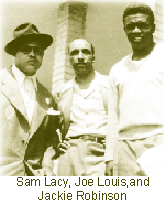 He was not allowed in white only locations on base. Jackie began is fight against racism by not allowing ignorance to be an excuse for racist members of the military. He was honorably discharged in the 1944. He was ready to complete his destiny as the chosen one.
Sam Lacey was the unsung hero of the Jackie Robinson story. Along with Wendell Smith, Lacey confronted Jackie about the possibilities of paving the way for the desegregation of baseball. Lacey pressured Major League Baseball to open the door to a new pool of talent that was hiding in the Negro Leagues. Lacey's press coverage about Jackie caught the eye of the daring president of the Dodgers, Branch Rickey. Jackie's baseball Journey was started, and he would prove Lacey and Smith's prediction correct, he was the man to lead the way for his sport and his race.
He was not allowed in white only locations on base. Jackie began is fight against racism by not allowing ignorance to be an excuse for racist members of the military. He was honorably discharged in the 1944. He was ready to complete his destiny as the chosen one.
Sam Lacey was the unsung hero of the Jackie Robinson story. Along with Wendell Smith, Lacey confronted Jackie about the possibilities of paving the way for the desegregation of baseball. Lacey pressured Major League Baseball to open the door to a new pool of talent that was hiding in the Negro Leagues. Lacey's press coverage about Jackie caught the eye of the daring president of the Dodgers, Branch Rickey. Jackie's baseball Journey was started, and he would prove Lacey and Smith's prediction correct, he was the man to lead the way for his sport and his race.
The reason Jackie Robinson's story is so important isn't because other sports didn't have ground breakers when it came to desegregation but no other league had their first African-American athlete play at such a high level. He fought racism every step of the way and used his fame to write silent protest through the form of memos to presidents and other congressional leaders during the high days of the civil rights movement. In 1971 Jackie lost his son Jackie Jr. and one year later Jackie would be buried as well. He was a successful father of three and a loving husband. To the nation, he was a great baseball player but to the African American community he was so much more, he was a leader, courageous, and a role model. The fact that no other player will ever wear Jackie's number again is only a reminder of how important this hall-of-famer was to a nation struggling to deal with racial discrimination.
Back to Top
Professional Profile
| Jack Roosevelt Robinson Born: January 31, 1919, Cairo, GA Died: October 24, 1972, Stamford, CT Batted: right Threw: right Team: Brooklyn Dodgers Elected to Hall of Fame: 1962 124 votes of 160 ballots cast: 77.50% | 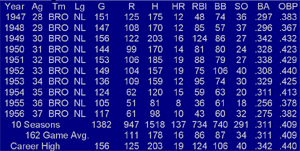 |
Back to Top
Achievements
High School and College Starred in autobiographical movie"The Jackie Robinson Story" in 1950. | 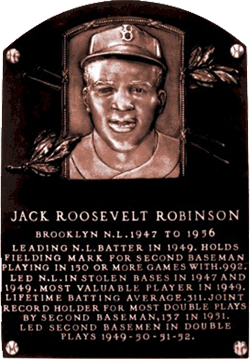 |
Back to Top
The Event That Changed The World:The Integration of Baseball
When Branch Rickey called Jackie Robinson into his office in 1945 he knew he needed the right man to break the color barrier in professional sports. By the time Jackie left Branch knew he had found him. He made it apparent to Jackie from the beginning that he was going to be called every name in the book, Jackie quickly responded, "I got two cheeks." The chosen one was signed and became the first African-American in the Minor Leagues. He started his season with a bang on opening day, April 18, 1946. He had two bunt singles, two steals, a hard hit single, was balked twice while on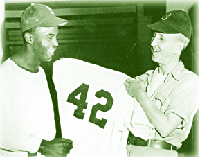 third and toped the game off with a 3 run home run. The home crowd at Roosevelt Stadium, in Jersey City, left in awe as they couldn't believe the 14-1 beating their team received from Jackie and his Montreal Royals. Jackie was able to lead his team to the "Little" World Series and was ready to make his mark in Brooklyn.
third and toped the game off with a 3 run home run. The home crowd at Roosevelt Stadium, in Jersey City, left in awe as they couldn't believe the 14-1 beating their team received from Jackie and his Montreal Royals. Jackie was able to lead his team to the "Little" World Series and was ready to make his mark in Brooklyn. The Dodgers purchased Jackie's contract the following year on April 10th. Five days later the color barrier fell as Jackie played in his first game. He went hitless but the importance of what he had accomplished by being there more than made up for his lack of production that day. Two games later he would hit his first home run and it was clear that Jackie was here to stay. His stay in professional sports was not made so easy by the opposing players and fans, let alone his own teammates.
In 1947 several Dodger players refused to play in spring training because of Jackie being on the team, this was quickly fixed by Rickey reminding the players that their termination could be easily arranged. The Cardinals tried to gain support to end Jackie's career but National League President, Ford Frick, quickly threatened to suspend them. Teammates like Pee Wee Reese weren't afraid to defend Jackie as he faced the endless scrutiny that was presented day in and day out. He was barred from most hotels and restaurants that the team stayed and ate at. He was yelled at and treated like a freak at most Major League parks and to top it all off he had to deal with racist umpires who could change their strike zone and determine the outcome of close plays. Through it all though Jackie maintained his cool and was able to keep his agreement with Rickey to keep silent despite his fierce and aggressive nature.
After the two years were up Jackie was ready to speak out against the racial and social unjust that took place in our country. He would continue to do so until his death in 1972. He went on to play ten seasons with the Dodgers after signing the historic contract but none were more important than his first. He defeated every adversity that was thrown at him and was proudly declared the Nation League Rookie of the Year. What a rookie season it was for America! The true rookie wasn't Jackie Robinson; instead it was the nation's acceptance that began to take shape. Jackie had played baseball nearly all his life, but America was just starting to accept African Americans, even 50 years later America still shows rookie tendencies but thanks to Jackie Robinson there is a bit more veteran swagger.
Back to Top